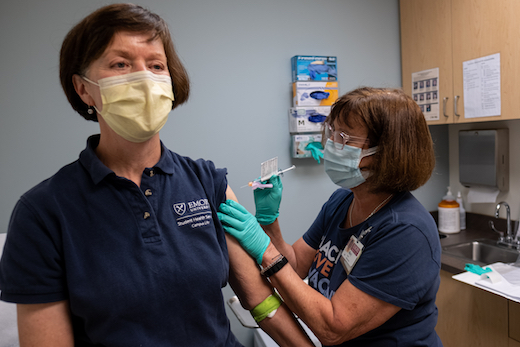ATLANTA — Emory University is participating in a Phase I clinical trial testing the safety and immune responses of a vaccine against the B.1.351 variant of the SARS-CoV-2 virus. The first doses were administered at the Hope Clinic of Emory Vaccine Center on Wednesday, March 31.
The vaccine was developed by Moderna, Inc. It uses the same mRNA technology as the Moderna vaccine that was authorized by the FDA in December, and is now being distributed nationwide. This new trial is being led and supported by the National Institute of Allergy and Infectious Diseases (NIAID), part of the National Institutes of Health.
Nationwide, the trial will enroll about 210 healthy adult volunteers at four clinical research sites – including Emory – that are part of the NIAID-funded Infectious Diseases Clinical Research Consortium (IDCRC). This Phase 1 clinical trial will enroll participants at Emory, along with Kaiser Permanente Washington Health Research Institute in Seattle, Vanderbilt University Medical Center in Nashville, and Cincinnati Children’s Hospital Medical Center in Cincinnati.
The B1.351 variant was first identified in South Africa and has been detected in at least nine states in the United States. The B1.351 variant has a number of mutations which may alter the immune system’s ability to recognize and neutralize the virus, even after prior SARS-CoV-2 infection or vaccination. The variant vaccine candidate tested in this study incorporates these key mutations in the vaccine. While preliminary data show that current COVID-19 vaccines should provide some protection against SARS-CoV-2 variants, it is important to evaluate alternatives in case updated vaccines are necessary.
“Building on the successful COVID-19 vaccine studies from last year, this trial should provide critical information on how to adapt vaccines to changes in the SARS-CoV-2 virus,” says Nadine Rouphael, MD, professor of medicine and executive director of the Hope Clinic of Emory Vaccine Center, who is leading the study at Emory.
The trial includes volunteers from the Atlanta and Seattle areas who participated in the phase I trial of the original Moderna mRNA-1273 vaccine that began in March 2020, but will also seek to enroll people who have not yet received any COVID-19 vaccine. Those people will be randomly assigned to different groups, and members of those groups will receive vaccine regimens testing the new vaccine in combination with the original Moderna mRNA-1273 vaccine.
More information about the vaccine regimens is available at clinicaltrials.gov or at NIAID.
“This is the next stage in addressing the COVID-19 pandemic,” says Evan Anderson, MD, site investigator for the trial on Emory’s campus at the Emory Children's Clinic-Vaccine Research Clinic (ECC-VRC). “We are very thankful for the volunteers from our previous Phase I study that are returning, along with new participants.”
Anderson is professor of medicine and pediatrics at Emory University School of Medicine, as well as a physician at Children’s Healthcare of Atlanta. The ECC-VRC started the study on Thursday, April 1.
The new study is designed to test safety and reactogenicity for the modified mRNA-1273.351 vaccine, as well as its ability to induce an immune response. Reactogenicity can include injection site reactions like redness and pain as well as systemic reactions such as fever, fatigue or muscle aches. Participants will be closely monitored for safety and will be asked to return to the study clinic for multiple follow-up visits between vaccinations and for additional visits during the year after their last vaccination. Participants also will be asked to provide blood samples at specified times throughout the trial. Scientists will use these samples to measure the immune response against circulating strains of SARS-CoV-2, including the B1.351 variant.
Volunteers should not have a known history of COVID-19 or SARS-CoV-2 infection. They also need to not have health conditions that are associated with an increased risk of severe illness from SARS-CoV-2 infection, such as cancer, heart conditions, type 2 diabetes mellitus, severe obesity or chronic kidney disease. Those interested in participating in the trial at Emory may volunteer through the following:
Emory Vaccine Center Hope Clinic
Emory Children’s Center (email)
The study is supported by Emory’s Vaccine and Treatment Evaluation Unit (VTEU), which is part of the IDCRC. Emory has been a VTEU site since 2007, and it currently led by Drs Rouphael, Anderson and Carlos Del Rio, MD, executive associate dean of Emory University School of Medicine.
The IDCRC is co-led by co-principal investigators David S. Stephens of Emory University School of Medicine, and Kathleen Neuzil of the University of Maryland School of Medicine. Stephens is professor and chair of Emory’s Department of Medicine and vice president for research of the Woodruff Health Sciences Center. This trial at Emory was supported in part by the NIAID grant UM1AI148576.

